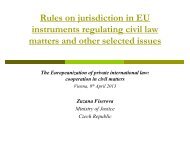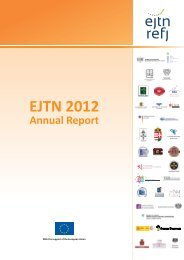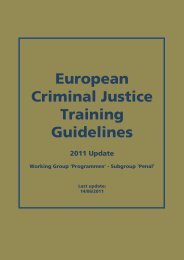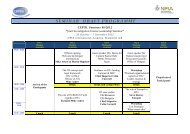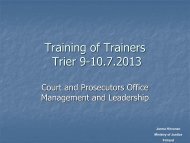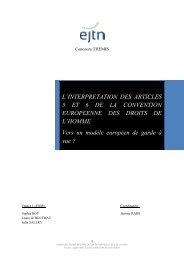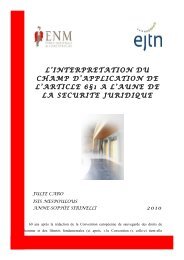Written paper Belgium_1.pdf - European Judicial Training Network
Written paper Belgium_1.pdf - European Judicial Training Network
Written paper Belgium_1.pdf - European Judicial Training Network
Create successful ePaper yourself
Turn your PDF publications into a flip-book with our unique Google optimized e-Paper software.
Although <strong>Belgium</strong> is a federal country with communities and regions, each with their own<br />
legislature and executive, there is only one judiciary who decides about both communities and<br />
regions.<br />
As will be discusses, there exists since 2002 an organ to protect de independence of the<br />
judiciary, namely the High Council of Justice. This Council guarantees an objective selection<br />
of potential magistrates en even provides in their education.<br />
The division of powers as such, although a basic principle of the Belgian state of law, is<br />
remarkably not expressly confirmed in the Belgian Constitution of 1831. One must deduce<br />
this division of the “spirit” of the Belgian Constitution (prof. VUYE, in the Belgian <strong>paper</strong> ‘De<br />
Morgen’ of 19 december 2008). In fact there is more a collaboration between the different<br />
powers than a division. This shows in the following articles of the Belgian Constitution:<br />
Article 36: the federal legislature is exercised both by the Chamber of Deputies, the<br />
Senate (the legislature) and the King (legislature (art. 36 Constitution) and executive<br />
(art. 37 Constitution).<br />
Article 151 §4: the King (executive) appoints the judges (judiciary)<br />
Article 40, 1: judgments (judiciary) are implemented in name of the King (executive).<br />
Within the specific Belgian context, in one particular case there is a possible blend of powers.<br />
Magistrates (judiciary) can be posted in ministerial cabinets (executive) or in workgroups<br />
founded by the executive (although those activities have to do with the modernization of the<br />
operation of the judiciary).<br />
Latter problems are the object of the further discussion of this <strong>paper</strong>.<br />
1.What is a secondment?<br />
From a general employment law position, a secondment comes down to lending employees to<br />
a third partie. Mostly this happens because of the specific expertise of the employee.<br />
Secondment is mainly a used technique within the private sector. Nevertheless there are<br />
secondments within the public sector, namely within the judiciary.<br />
10



